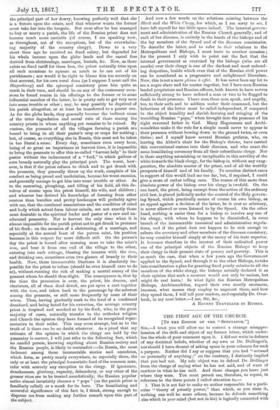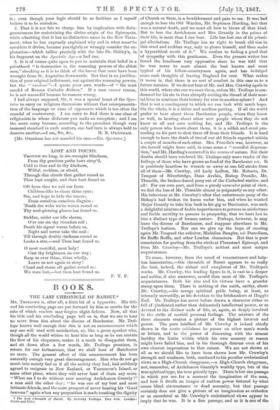THE FIRST AGE OF THE CHURCH. [TO THE EDITOR OF
THE " SPECTATOR."] SIR,-I trust you will allow me to correct a strange misappre- hension of the drift and object of my former letter, which under- lies the whole of your comment upon it. I did not write in defence of any doctrinal beliefs, whether of my own or Dr. Malinger's, nor should I have dreamt of asking space in your columns for such a purpose. Neither did I say or suppose that you had " accused me personally of anything ;" on the contrary, I distinctly implied that you had not. My sole object was to defend Dr. Malinger from the charge of saying what he has not said, and of want of candour in what he has said. And those charges you leave just where they were. You must permit me, therefore, to repeat, in reference to the three points I called attention to,-
1. That it is not fair to make an author responsible for a parti- cular " theory of priestly power," than which, as you state it, nothing can well be more odious, because he defends something else which in your mind (but not in his) is logically connected with it ; even though your logic should be as faultless as I myself believe it to be mistaken.
2. That it is not fair to charge him by implication with disin- genuousness for maintaining the divine origin of the Episcopate, while admitting that it has no distinctive name in the New Testa- ment, when he has expressly explained why and in what sense he cpnsiders it divine, because you rightly or wrongly consider the ex- planation—which tallies precisely with the late Dr. Shirley's, in his fragment on the Apostolic Age—a bad one.
3. It is of course quite open to you to maintain that belief in a priesthood " is destructive to the reasoning powers of the ablest men," shocking as it is to think of the havoc that must have been wrought from St. Augustine downwards. But that is no justifica- tion of your original indictment, not against the reasoning powers, but the " candour"—I quote your own words—of " the most candid of Roman Catholic divines." If a man cannot reason, he is not uncandid because he reasons wrong.
I bad always supposed, Sir, it was a special boast of the Spec- tator to carry on religious discussions without that misrepresenta- tion of the language or aims of opponents which is too often the - scandal of controversy. I am sorry to find there is one class of religionists in whose disfavour you make an exception ; and I am the more sorry because, according to the prevalent though very immoral standard in such matters, one bad turn is always held to































 Previous page
Previous page